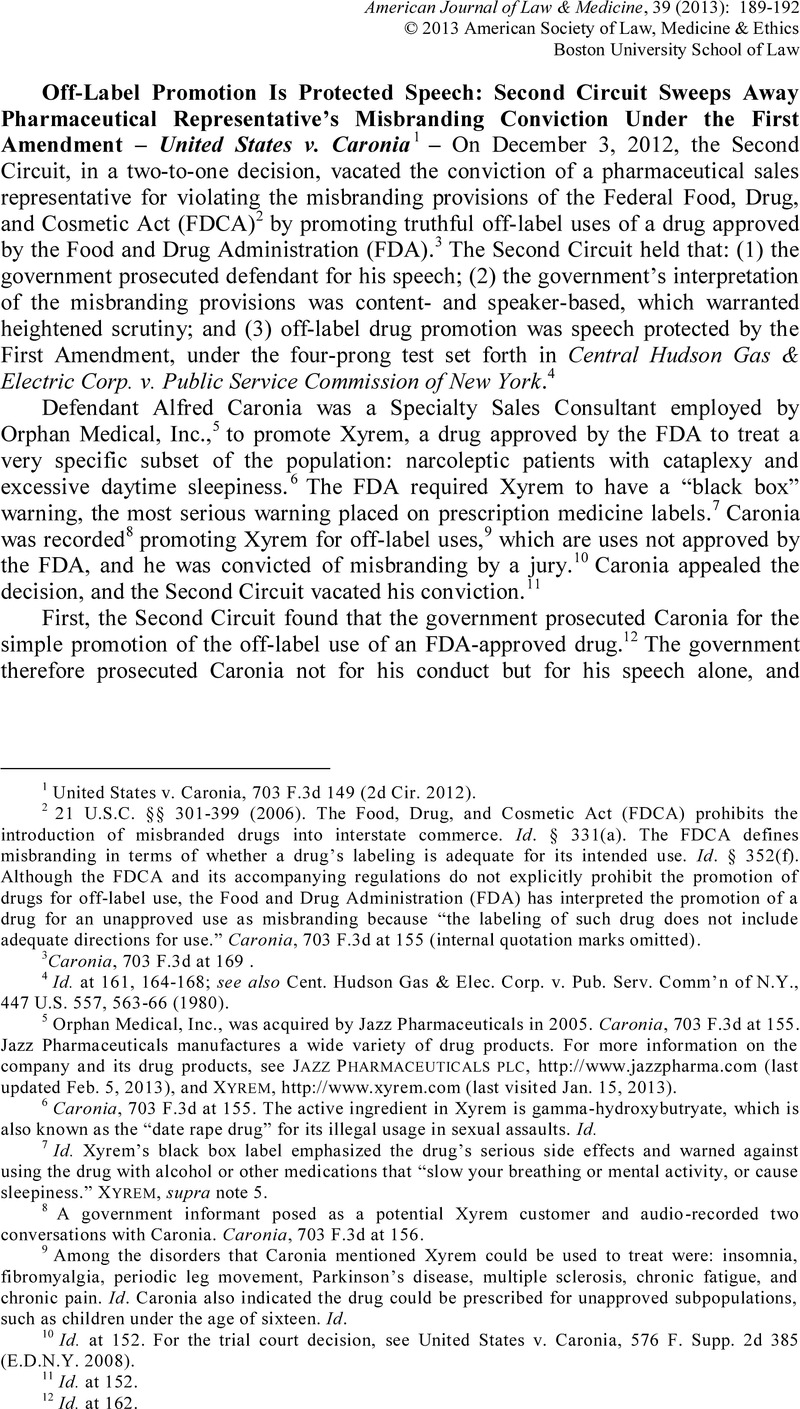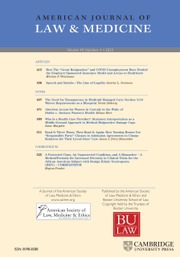No CrossRef data available.
Article contents
Off-Label Promotion Is Protected Speech: Second Circuit Sweeps Away Pharmaceutical Representative’s Misbranding Conviction Under the First Amendment – United States v. Caronia
Published online by Cambridge University Press: 06 January 2021
Abstract

- Type
- Recent Case Developments
- Information
- Copyright
- Copyright © American Society of Law, Medicine and Ethics and Boston University 2013
References
1 United States v. Caronia, 703 F.3d 149 (2d Cir. 2012).
2 21 U.S.C. §§ 301-399 (2006). The Food, Drug, and Cosmetic Act (FDCA) prohibits the introduction of misbranded drugs into interstate commerce. Id. § 331(a). The FDCA defines misbranding in terms of whether a drug's labeling is adequate for its intended use. Id. § 352(f). Although the FDCA and its accompanying regulations do not explicitly prohibit the promotion of drugs for off-label use, the Food and Drug Administration (FDA) has interpreted the promotion of a drug for an unapproved use as misbranding because “the labeling of such drug does not include adequate directions for use.” Caronia, 703 F.3d at 155 (internal quotation marks omitted).
3 Caronia, 703 F.3d at 169 .
4 Id. at 161, 164-168; see also Cent. Hudson Gas & Elec. Corp. v. Pub. Serv. Comm’n of N.Y., 447 U.S. 557, 563-66 (1980).
5 Orphan Medical, Inc., was acquired by Jazz Pharmaceuticals in 2005. Caronia, 703 F.3d at 155. Jazz Pharmaceuticals manufactures a wide variety of drug products. For more information on the company and its drug products, see JAZZ PHARMACEUTICALS PLC, http://www.jazzpharma.com (last updated Feb. 5, 2013), and XYREM, http://www.xyrem.com (last visited Jan. 15, 2013).
6 Caronia, 703 F.3d at 155. The active ingredient in Xyrem is gamma-hydroxybutryate, which is also known as the “date rape drug” for its illegal usage in sexual assaults. Id.
7 Id. Xyrem's black box label emphasized the drug's serious side effects and warned against using the drug with alcohol or other medications that “slow your breathing or mental activity, or cause sleepiness.” XYREM, supra note 5.
8 A government informant posed as a potential Xyrem customer and audio-recorded two conversations with Caronia. Caronia, 703 F.3d at 156.
9 Among the disorders that Caronia mentioned Xyrem could be used to treat were: insomnia, fibromyalgia, periodic leg movement, Parkinson's disease, multiple sclerosis, chronic fatigue, and chronic pain. Id. Caronia also indicated the drug could be prescribed for unapproved subpopulations, such as children under the age of sixteen. Id.
10 Id. at 152. For the trial court decision, see United States v. Caronia, 576 F. Supp. 2d 385 (E.D.N.Y. 2008).
11 Id. at 152.
12 Id. at 162.
13 Id. at 162 (quoting Sorrell v. IMS Health, Inc., 131 S. Ct. 2653, 2659 (2011)).
14 Sorrell, 131 S. Ct. 2653 (striking down a Vermont statute restricting the sale and disclosure of prescriber-identifying information for violating pharmaceutical companies’ First Amendment rights). Sorrell applied a two-step inquiry: (1) whether the regulation is content-based and speaker-based in such a way that it warrants heightened judicial scrutiny, and (2) whether the regulation can withstand the level of heightened scrutiny once it is applied under the First Amendment. Id. at 2656-59.
15 Caronia, 703 F.3d at 164.
16 Id, at 165.
17 Id.
18 Central Hudson sets out a four-prong test: (1) the speech must not be misleading and must concern lawful activity; (2) the asserted government interest must be substantial; (3) the regulation must advance the governmental interest asserted to a material degree; and (4) the regulation must be narrowly drawn. Id. at 164 (citing Cent. Hudson, 447 U.S. at 563-66).
19 Id. at 166.
20 Id.
21 Id. at 167.
22 Id.
23 Id. at 168.
24 Id. at 177 (Livingston, J., dissenting).
25 Id. at 178 (Livingston, J., dissenting).
26 Id. at 179 (Livingston, J., dissenting).
27 Jeffrey N. Wasserstein & Kurt R. Karst, A Deep Dive into the Second Circuit's Caronia Decision, Potential Next Steps, and Potential Enforcement Fallout, FDA L. BLOG (Dec. 12, 2012, 1:37 AM), http://www.fdalawblog.net/fda_law_blog_hyman_phelps/2012/12/a-deep-dive-into-the-second-circuits-caronia-decision-potential-next-steps-and-potential-enforcement.html.
28 United States v. Harkonen, No. C08-00164MHP, 2010 WL 2985257, at *1 (N.D. Cal. July 27, 2010).
29 Wasserstein & Karst, supra note 27.
30 See Harkonen, 2010 WL 2985257, at *15.
31 Id. at *15.
32 Erika Kelton, Off-Label Pharma Prosecutions Won't Be Silenced by First Amendment Decision, FORBES (Jan. 4, 2013, 1:10 PM), http://www.forbes.com/sites/erikakelton/2013/01/04/off-label-pharma-prosecutions-wont-be-silenced-by-first-amendment-decision.
33 Thomas M. Burton, FDA Won't Appeal Free-Speech Marketing Decision, WALL ST. J. (Jan. 23, 2013, 8:20 PM), http://online.wsj.com/article/SB10001424127887324539304578260323575925896.html.
34 Wasserstein & Karst, supra note 27.
35 Katie Thomas, Ruling Is Victory for Drug Companies in Promoting Medicine for Other Uses, N.Y. TIMES (Dec. 3, 2012), http://www.nytimes.com/2012/12/04/business/ruling-backs-drug-industry-on-off-label-marketing.html.
36 Editorial, The Limits of Free Speech, 492 NATURE 311 (2012), available at http://www.nature.com/news/the-limits-of-free-speech-1.12062.
37 Mit Spears, A Victory for Free Speech – and Also for Patients. MILWAUKEE-WIS. J. SENTINEL (Dec. 26, 2012), http://www.jsonline.com/news/opinion/a-victory-for-free-speech--and-also-for-patients-cc84k02-184861381.html.




